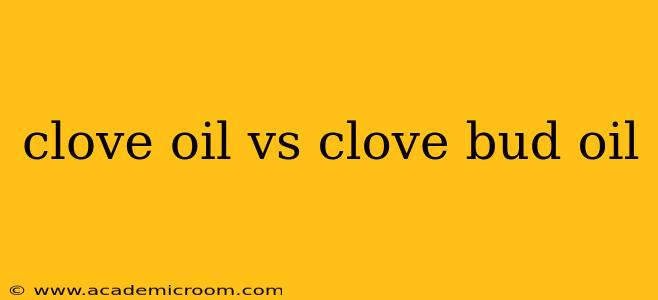Clove oil is a popular essential oil known for its potent aroma and numerous health benefits. However, a common point of confusion arises between "clove oil" and "clove bud oil." While often used interchangeably, there are subtle yet important distinctions between the two. This article will delve into these differences, clarifying their origins, properties, and applications.
What is Clove Bud Oil?
Clove bud oil is extracted directly from the dried flower buds of the Syzygium aromaticum tree, also known as the clove tree. These buds are harvested before they fully bloom and then meticulously dried. The oil is then extracted through steam distillation, a process that captures the volatile aromatic compounds responsible for clove's characteristic fragrance and therapeutic properties. This method ensures a high concentration of eugenol, the primary active component in clove oil, which contributes to its medicinal properties.
Key characteristics of clove bud oil:
- Source: Dried flower buds of the Syzygium aromaticum tree.
- Extraction: Steam distillation.
- High Eugenol Content: Typically contains a high percentage of eugenol (often above 85%).
- Potent Aroma: Possesses a strong, warm, and spicy aroma.
What is Clove Oil?
The term "clove oil" is often used as a broader term encompassing various extracts from the clove plant. While it often refers to clove bud oil, it can also include oils derived from other parts of the clove tree, such as the leaves or stems. These oils might have slightly different chemical compositions and aromatic profiles compared to clove bud oil. The variation in composition could affect the potency and efficacy for certain applications.
Key characteristics of clove oil (general):
- Source: Can be derived from different parts of the clove tree (buds, leaves, stems).
- Extraction: Steam distillation is the most common method.
- Eugenol Content: The eugenol content can vary depending on the plant part used.
- Aroma: Generally shares the characteristic warm, spicy aroma of clove bud oil, but subtle nuances might exist depending on the source.
What are the main differences between clove bud oil and clove oil?
The primary difference lies in the source material. Clove bud oil is specifically extracted from the flower buds, resulting in a more consistent and typically higher concentration of eugenol. "Clove oil," as a more general term, may incorporate extracts from other parts of the plant, leading to variations in chemical composition and therefore, in potential therapeutic properties.
Is one better than the other?
There isn't a definitive "better" oil. The choice depends on the intended use. For applications requiring a high concentration of eugenol, such as certain aromatherapy treatments or topical applications for pain relief, clove bud oil is generally preferred. However, if the specific composition isn't critical, "clove oil" might be a suitable option. Always check the product label to ensure clarity regarding the source and composition of the oil.
What are the common uses of clove bud oil?
Clove bud oil, due to its high eugenol content, is frequently used for:
- Aromatherapy: Its warm, spicy scent is often used to promote relaxation and reduce stress.
- Dental applications: It's known for its analgesic and antiseptic properties, often used as a natural remedy for toothaches.
- Topical pain relief: It can be diluted and applied topically to relieve muscle aches and joint pain.
Are there any potential side effects of using clove oil or clove bud oil?
While generally safe when used properly (diluted for topical use), clove oil and clove bud oil can cause some side effects, including:
- Skin irritation: Always dilute before topical application.
- Allergic reactions: Conduct a patch test before widespread use.
- Ingestion: Should never be ingested without professional advice. It can be toxic if consumed in large quantities.
Conclusion: Choosing the Right Clove Oil
While the terms are often used interchangeably, understanding the difference between clove bud oil and clove oil can help you make an informed choice. Clove bud oil, with its higher eugenol concentration and consistent quality, is typically preferred when potency is a primary concern. However, both oils share many similar benefits and can be effective in various applications. Always choose reputable suppliers and read product labels carefully before use. Remember to consult with a healthcare professional before using essential oils for therapeutic purposes, especially if you have pre-existing health conditions or are taking medications.
